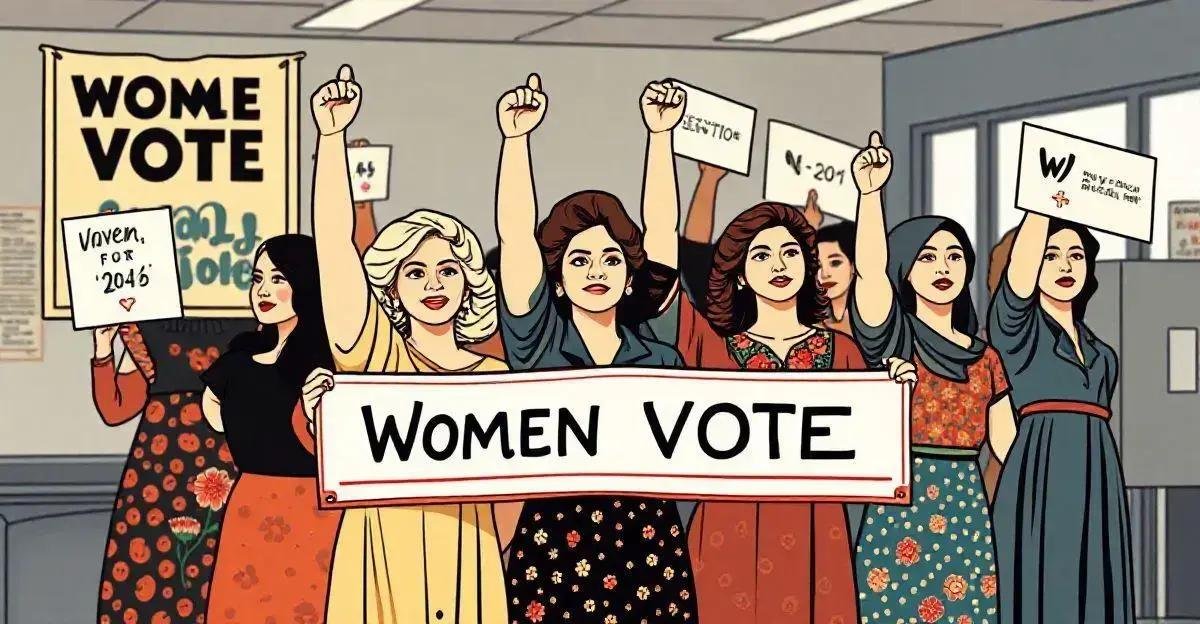As the 2024 elections approach, the women’s vote is gaining increasing attention.
With the fight for woman’s suffrage spanning over a century, women’s participation in the electoral process is more crucial than ever.
The women’s vote has the potential to significantly impact the outcome of elections, shaping the future of society and addressing issues that disproportionately affect women.
In this article, we will explore the significance of the women’s vote, the barriers that women face when exercising this right, and the power it holds in determining the course of our democracy.
Woman’s Suffrage: A Historical Perspective
The women’s suffrage movement, which began in the late 19th century, was a long and arduous struggle for women’s right to vote.
Despite facing numerous obstacles and setbacks, suffragists persisted in their efforts, using a range of tactics from peaceful protests to civil disobedience.
In 1920, the 19th Amendment to the US Constitution was finally ratified, granting women the right to vote.
However, the fight for equal representation did not end there.
The Equal Rights Amendment was proposed in 1972, but it has yet to be ratified.
Today, women’s suffrage remains an important issue, with ongoing efforts to promote greater political participation and representation.
The Impact of Female Representation

The impact of female representation in government and politics is multifaceted and far-reaching.
Research has consistently shown that countries with higher levels of female representation in government tend to have better governance, more inclusive policies, and greater economic stability.
Female leaders also tend to prioritize issues like education, healthcare, and social welfare, which are critical to the well-being of women and families.
Furthermore, female representation can help to break down barriers to entry for other underrepresented groups, creating a more diverse and representative government that better reflects the needs and concerns of all citizens.
Barriers to the Women’s Vote
Despite the progress made in women’s suffrage, there are still several barriers that prevent women from exercising their right to vote.
Voter suppression tactics, such as voter ID laws and gerrymandering, disproportionately affect minority and low-income women, making it harder for them to access the ballot.
Additionally,
lack of education and resources
can also hinder women’s ability to participate in the political process.
Furthermore, societal norms and attitudes towards women’s roles in society can also create barriers, making it difficult for women to take on leadership positions and participate in politics.
It is essential to address these barriers to ensure that all women have an equal opportunity to exercise their right to vote.
The Power of the Women’s Vote in 2024

The 2024 elections are just around the corner, and the power of the women’s vote is more crucial than ever.
Women’s participation in the political process has the potential to shape the future of the country, with issues like reproductive rights, equal pay, and healthcare access hanging in the balance.
Research has shown that when women vote, they prioritize issues that benefit their families and communities, such as education and social services.
With the demographics of the voting population shifting, the women’s vote is poised to play a key role in determining the outcome of elections.
By exercising their right to vote, women can create a more just and equitable society for all.
Demographics and Voter Turnout
The demographics of the voting population are undergoing significant changes, with women and minorities making up an increasingly large proportion of eligible voters. As a result, voter turnout is becoming a critical factor in elections, with parties and candidates competing for the support of these key demographics.
Racial and ethnic minorities are particularly important in this regard, as they have historically been underrepresented in the political process. Understanding the demographics and voter turnout patterns of these groups is essential for candidates and parties seeking to win elections and represent the interests of their constituents.
By examining the demographics and voter turnout of different groups, we can gain a better understanding of the political landscape and the factors that influence voter behavior.
The Future of Women’s Representation

The future of women’s representation is uncertain, but one thing is clear: the fight for equality and inclusion is far from over.
As the demographics of the voting population continue to shift, women’s representation in government and politics will be a crucial factor in determining the direction of the country.
Advances in technology and social media have created new opportunities for women to engage in the political process and make their voices heard.
However, the barriers to entry remain significant, and women’s representation is still disproportionately low compared to their population share.
To ensure a more equitable future, it is essential to address these barriers and create a more inclusive political system that reflects the diversity of society.
FAQ – Frequently Asked Questions about Women’s Suffrage
What is the significance of the women’s vote?
The women’s vote is a crucial aspect of democratic participation, as it allows women to have a say in the direction of their country and to hold elected officials accountable for their actions.
How can women’s representation in government affect policy outcomes?
Women’s representation in government can lead to more inclusive and equitable policy outcomes, as women bring diverse perspectives and experiences to the decision-making process.
What are some barriers to women’s participation in the political process?
Some barriers to women’s participation in the political process include lack of education and resources, societal norms and attitudes, and systemic barriers such as voter suppression.
How can women’s representation in government impact the future of democracy?
Women’s representation in government can help ensure a more inclusive and equitable democracy, where all citizens have an equal voice in the political process.
What role can technology play in advancing women’s representation in government?
Technology can play a crucial role in advancing women’s representation in government by providing access to information, resources, and opportunities for women to engage in the political process.



